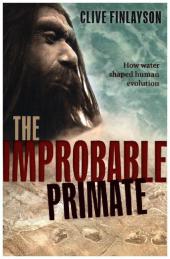 Neuerscheinungen 2016Stand: 2020-02-01 |
Schnellsuche
ISBN/Stichwort/Autor
|
Herderstraße 10
10625 Berlin
Tel.: 030 315 714 16
Fax 030 315 714 14
info@buchspektrum.de |

Clive Finlayson
The Improbable Primate
How Water Shaped Human Evolution
2016. 224 S. 13 black and white illustrations. 195 mm
Verlag/Jahr: OXFORD UNIVERSITY PRESS 2016
ISBN: 0-19-874389-0 (0198743890)
Neue ISBN: 978-0-19-874389-7 (9780198743897)
Preis und Lieferzeit: Bitte klicken
In The Improbable Primate, Clive Finlayson gives a provocative view of human evolution, arguing that the critical factor that shaped us was water. Questioning current accounts of tools and our spread from Africa, he presents an ecological viewpoint.
Taking an ecological approach to our evolution, Clive Finlayson considers the origins of modern humans within the context of a drying climate and changing landscapes. Finlayson argues that environmental change, particularly availability of water, played a critical role in shaping the direction of human evolution, contributing to our spread and success. He argues that our ancestors carved a niche for themselves by leaving the forest and forcing their way into a
long-established community of carnivores in a tropical savannah as climate changes opened up the landscape. They took their chance at high noon, when most other predators were asleep. Adapting to this new lifestyle by shedding their hair and developing an active sweating system to keep cool, being close to
fresh water was vital. As the climate dried, our ancestors, already bipedal, became taller and slimmer, more adept at travelling farther in search of water. The challenges of seeking water in a drying landscape moulded the minds and bodies of early humans, and directed their migrations and eventual settlements.
In this fresh and provocative view of a seven-million-year evolutionary journey, Finlayson demonstrates the radical implications for the interpretation of fossils and technologies and shows that understanding humans within an ecological context provides insights into the emergence and spread of Homo sapiens sapiens worldwide.
Finlayson writes in a dry, clear, scholarly style which somehow accentuates the sheer improbability of humanity´s long journey Brandon Robshaw, Independent on Sunday
Clive Finlayson is a noted expert on the Neanderthals and has been researching their final stand in Gibraltar. He is Director of the Gibraltar Museum and Adjunct Professor at the University of Toronto, having trained in Oxford as an evolutionary ecologist. His previous books include Neanderthals and Modern Humans: An Ecological and Evolutinary Perspective (CUP, 2004) and The Humans Who Went Extinct (OUP, 2009).


